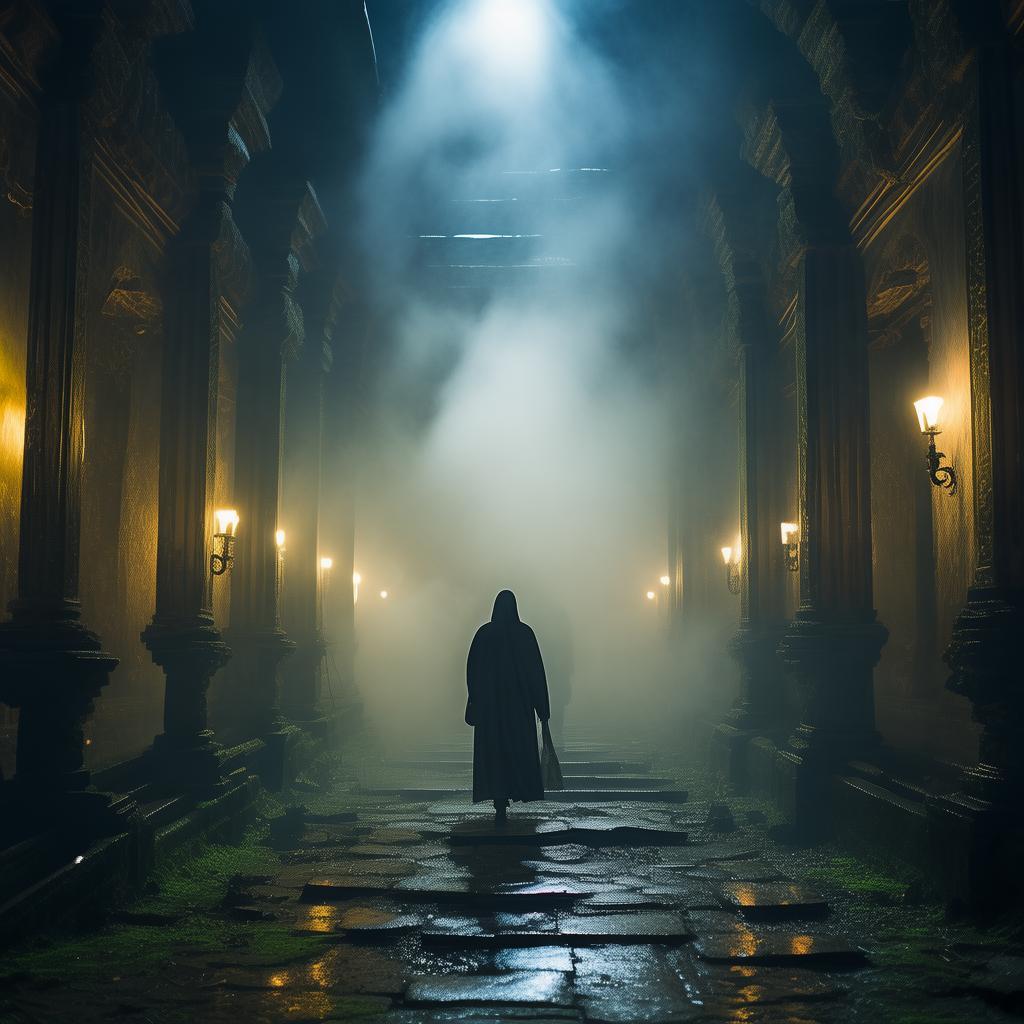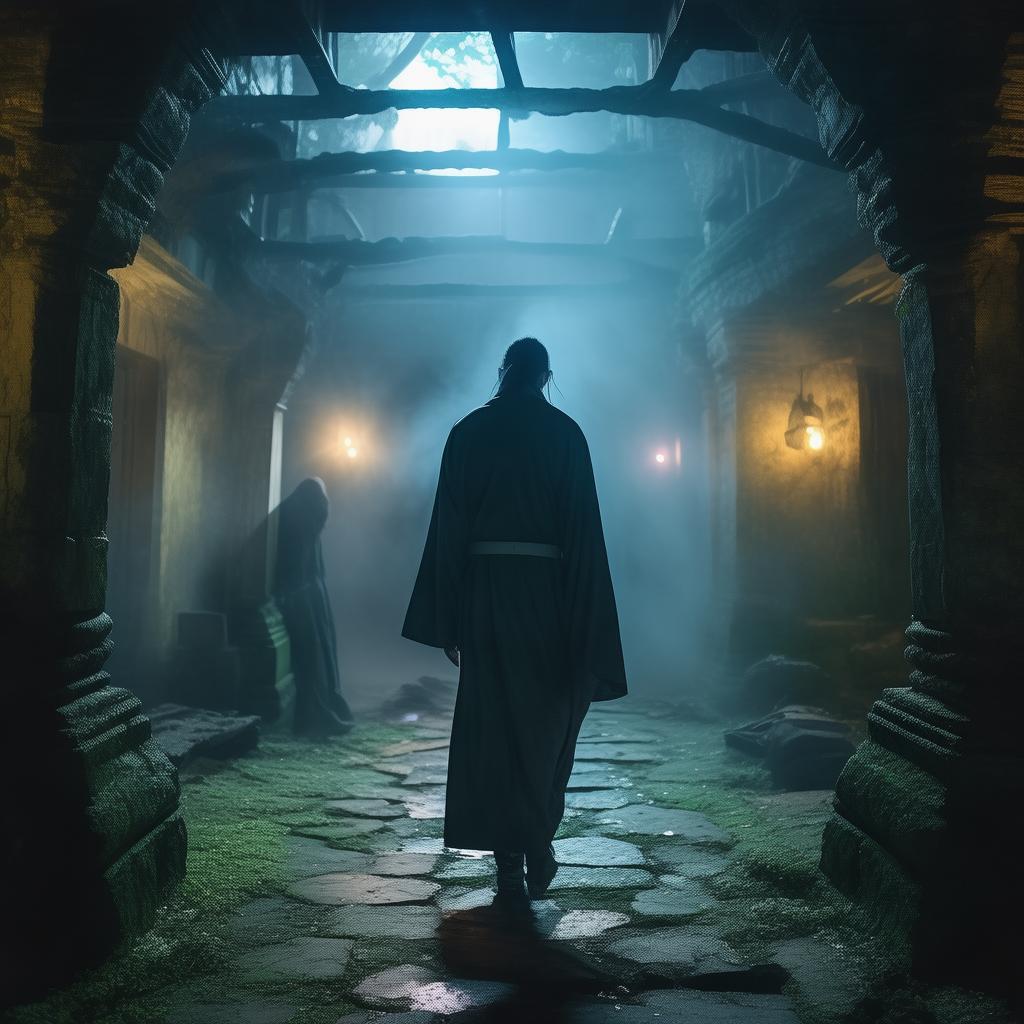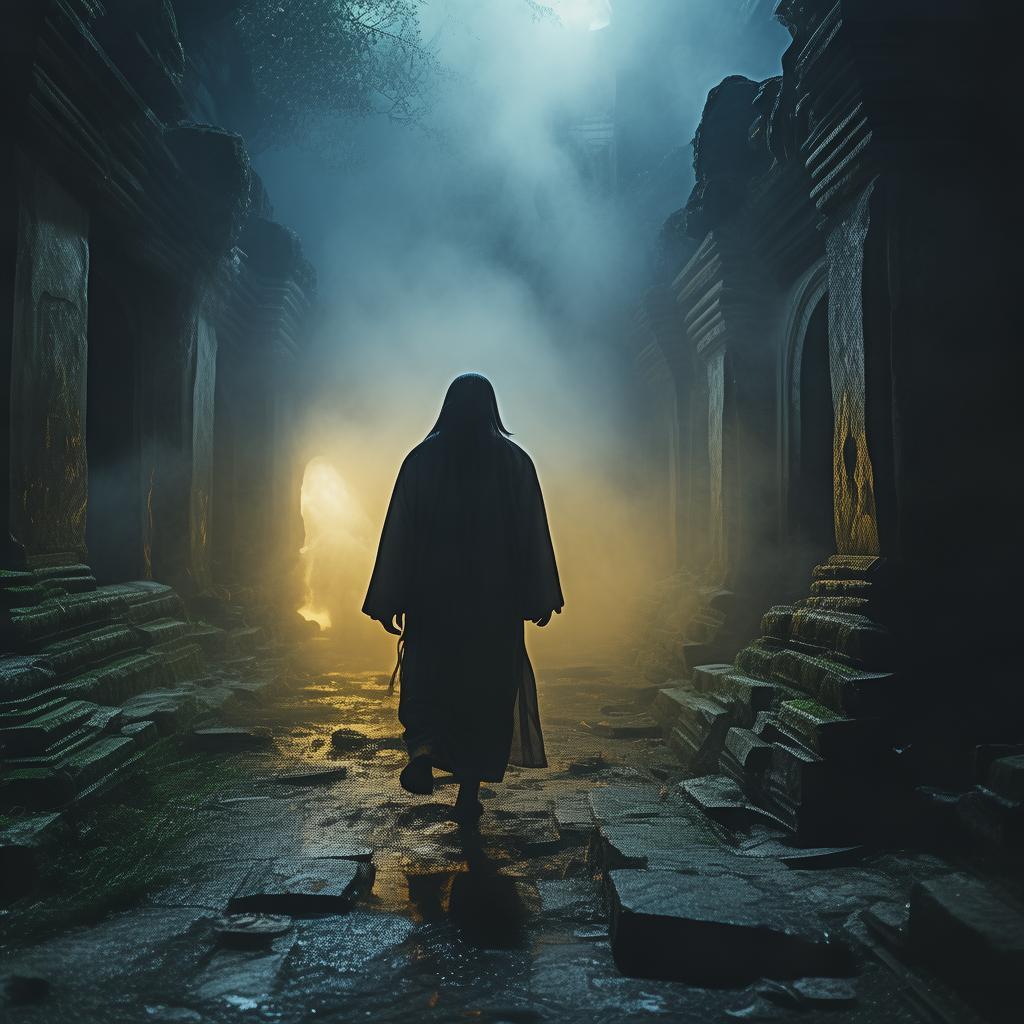The Whispering Shadows of the Banaras Ghat
The cool morning air carried the faint scent of incense from the numerous temples lining the banks of the Ganges. In the heart of Varanasi, India, a young historian named Arjun stood at the edge of the Banaras Ghat, his eyes scanning the river that had witnessed centuries of life and death. It was here, amidst the cacophony of pilgrims and the constant flow of the sacred river, that Arjun had decided to unravel the enigma of India's haunted realms, as documented in "Whispers of the Mystic Ganges."
Arjun had always been fascinated by the supernatural. His latest research project had taken him to the heart of Banaras, a city steeped in history and myth. The Banaras Ghat, in particular, had a reputation for being haunted. Legends spoke of ghostly apparitions, unexplained sounds, and eerie presences that left even the most seasoned locals shivering.
The historian's quest began one misty morning when he stumbled upon an old, tattered book at the local library. "Whispers of the Mystic Ganges" detailed the ghost stories of the Ghat, including the tale of the Rana family, a once-powerful dynasty that had mysteriously vanished. The book spoke of a curse that had befallen the Ranas, causing their descendants to suffer misfortune and death.
Determined to uncover the truth, Arjun set out to interview the few remaining members of the Rana family. His first stop was the dilapidated mansion that once belonged to the Ranas. The building, now a shell of its former grandeur, stood at the edge of the Ghat, overlooking the river.
Inside, the air was thick with dust and decay. Arjun's footsteps echoed through the empty halls, each creak a reminder of the mansion's forgotten past. He met an elderly woman, the last living member of the Rana family, in a dimly lit room filled with old portraits and forgotten relics.
"Are you the historian from Delhi?" the woman asked, her voice trembling with age and sorrow.
"I am," Arjun replied, taking a seat opposite her. "I have come to learn about your family's history and the curse that plagues you."
The woman sighed, her eyes reflecting the pain of generations. "The curse began with my great-grandfather. He was a vain and ruthless ruler, who sought to conquer the entire Ganges Valley. But in his greed, he offended the gods, and they cursed our line."
Arjun's interest piqued. "How did the curse manifest?"
The woman's eyes grew distant. "It took many forms. There were the unexplained fires, the mysterious illnesses, and the sudden deaths. My ancestors were doomed to suffer, and so am I."
As the interview progressed, Arjun realized that the curse was not just a supernatural phenomenon but also a historical enigma. The Ranas had been a powerful dynasty, and their downfall had been shrouded in mystery. Arjun's research led him to discover that the Ranas had been involved in a complex web of political intrigue, betrayal, and deceit.
The historian's next stop was the local archives, where he uncovered a trove of forgotten documents. Among them were letters and diaries that detailed the Ranas' involvement in a secret society known as the "Mystic Circle." The Circle, it seemed, had been a group of influential figures who sought to control the fate of India through esoteric knowledge and supernatural means.
Arjun's investigation led him to a chilling discovery. The Ranas had not just offended the gods but had also betrayed the Mystic Circle, leading to their downfall. The curse, it turned out, was a supernatural manifestation of their betrayal.
One night, as Arjun stood by the river, gazing at the moonlit Ghat, he heard a faint whisper. It was the voice of a young woman, crying out for help. The historian followed the sound to an abandoned temple, where he found the ghost of a young Rana princess, trapped in a loop of sorrow and despair.

"Who are you?" Arjun asked, his voice trembling.
"I am Rani Lakshmi, the last princess of the Rana dynasty," the ghost replied. "I was betrayed and killed by my own family. Now I am trapped in this temple, forever crying for justice."
Arjun's heart ached for the young princess. He knew he had to break the curse, not just for the sake of the Rana family but for the peace of the Banaras Ghat.
Determined to help Rani Lakshmi, Arjun sought the wisdom of the local pandits, who offered a ritual to break the curse. As the ceremony began, the historian felt a strange sensation, as if the very fabric of time was unraveling around him.
When the ritual concluded, the ghost of Rani Lakshmi vanished, leaving Arjun with a sense of relief and fulfillment. The curse had been lifted, and the Banaras Ghat was once again free from its spectral presence.
As Arjun walked away from the Ghat, he couldn't shake the feeling that he had only scratched the surface of the enigma that was India's haunted realms. The Mystic Ganges continued to whisper secrets, and Arjun knew that he would return, seeking answers to the many mysteries that lay hidden beneath the river's surface.
The Whispering Shadows of the Banaras Ghat had not only provided Arjun with a thrilling adventure but also a glimpse into the supernatural and historical tapestry that wove the very fabric of India's past.
✨ Original Statement ✨
All articles published on this website (including but not limited to text, images, videos, and other content) are original or authorized for reposting and are protected by relevant laws. Without the explicit written permission of this website, no individual or organization may copy, modify, repost, or use the content for commercial purposes.
If you need to quote or cooperate, please contact this site for authorization. We reserve the right to pursue legal responsibility for any unauthorized use.
Hereby declared.









